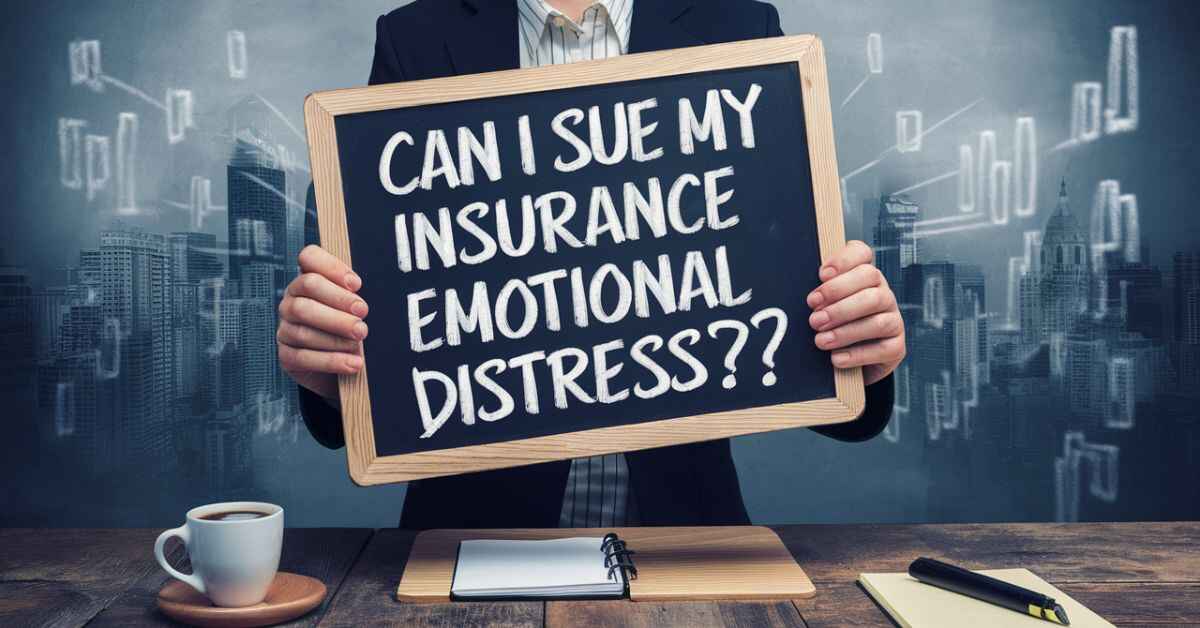Dealing with insurance companies can be a nightmare. You’ve faithfully paid your premiums but when disaster strikes your insurer seems more interested in their bottom line than your well-being. The constant battles denials and delays don’t just hit your wallet they take a toll on your mental health.
Understanding Emotional Distress in Insurance Claims
Before we tackle the legal aspects, let’s get clear on what we mean by emotional distress. It’s more than just feeling frustrated or annoyed. Emotional distress in the context of insurance claims refers to severe mental anguish that disrupts your daily life. This could manifest as:
- Anxiety and panic attacks
- Depression
- Insomnia
- Post-traumatic stress disorder (PTSD)
- Suicidal thoughts
Imagine John, a homeowner in Florida. A hurricane devastates his house, and he’s left homeless. His insurance company drags its feet, nitpicks every detail, and leaves him in limbo for months. John’s stress skyrockets, his health deteriorates, and he can’t focus at work. This isn’t just inconvenience it’s emotional distress.
Legal Grounds for Suing Insurance Companies

Now can you take that distress to court? The answer isn’t a simple yes or no. It depends on various factors, including your location and the specifics of your case. However there are several legal grounds on which you might build a case:
- Bad faith insurance practices: This is the most common basis for emotional distress lawsuits against insurers. Bad faith occurs when an insurance company unreasonably denies, delays, or underpays a valid claim.
- Breach of contract: Your insurance policy is a contract. If the company fails to honor its terms, that’s a breach, which could lead to emotional distress.
- Negligence: If the insurer’s carelessness in handling your claim causes you harm, you might have a case for negligence.
- Intentional infliction of emotional distress: This is a high bar to clear, but if an insurer’s conduct is truly outrageous and intended to cause distress, it could apply.
Country-Specific Legal Considerations
The legal landscape for suing insurance companies varies significantly between the USA, Sri Lanka, and Vietnam. Let’s break it down:
United States
In the U.S., insurance law is primarily governed at the state level, leading to significant variations across the country. However some general principles apply:
- Most states recognize bad faith as a cause of action against insurers.
- Punitive damages may be available in cases of egregious misconduct.
- Some states have specific statutes addressing unfair insurance practices.
Case Study: In 2020, a jury in Oklahoma awarded $25 million to a policyholder for bad faith and emotional distress after their insurance company denied a valid claim for a house fire.
Sri Lanka
Sri Lanka’s legal framework for insurance disputes is less developed than in the U.S., but options exist:
- The Insurance Board of Sri Lanka (IBSL) regulates the industry and can hear complaints.
- The Consumer Affairs Authority can intervene in cases of unfair practices.
- Civil courts can hear cases based on breach of contract or negligence.
Vietnam
Vietnam’s insurance market is rapidly developing, and so is its legal framework:
- The Insurance Business Law of 2000 (amended in 2010) governs insurance activities.
- The Civil Code provides general provisions on compensation for damage.
- Administrative sanctions can be imposed on insurers for violations.
The right to sue for emotional distress varies widely across jurisdictions. It’s crucial to consult with a local attorney familiar with insurance law in your specific location.
Steps to Take Before Suing Your Insurance Company
Before you rush to court, consider these steps:

- Document everything: Keep detailed records of all communications, including dates, names, and content of conversations.
- File a formal complaint: Submit a written complaint to your insurance company’s customer service department.
- Seek mediation or arbitration: Many policies include dispute resolution clauses that require these steps before litigation.
- Consult with a lawyer: An experienced insurance attorney can evaluate your case and advise on the best course of action.
Proving Emotional Distress in Court
If you do end up in court, proving emotional distress isn’t easy. You’ll typically need:
- Medical records: Documentation from mental health professionals can substantiate your claims.
- Expert testimony: Psychologists or psychiatrists may need to testify about the extent of your distress.
- Evidence of misconduct: You’ll need to show how the insurance company’s actions led to your distress.
- Proof of severity: Courts often require that the emotional distress be severe and prolonged.
Potential Outcomes of Emotional Distress Lawsuits
What can you expect if you win? Outcomes vary, but might include:
- Monetary compensation: This could cover medical bills, therapy costs, and general damages for pain and suffering.
- Policy reinstatement or revision: The court might order the insurer to honor your policy or revise unfair terms.
- Changes in company practices: In some cases, insurers may be required to modify their procedures to prevent future issues.
Alternatives to Lawsuits
- Regulatory complaints: File a complaint with your state’s insurance commissioner or relevant regulatory body.
- Public pressure: Social media and local news outlets can sometimes motivate insurers to resolve issues.
- Switching providers: While it doesn’t address past harm, finding a more reputable insurer can prevent future distress.
Tips for Dealing with Insurance Companies to Avoid Emotional Distress
Prevention is better than cure. Here’s how to minimize the risk of emotional distress:

- Read your policy carefully: Understand what’s covered and what’s not before you need to make a claim.
- Communicate clearly and keep records: Document all interactions with your insurer.
- Know your rights: Familiarize yourself with insurance laws in your jurisdiction.
- Be persistent but professional: Don’t let issues slide, but avoid becoming confrontational.
Frequently Asked Questions
How long do I have to file a lawsuit against my insurance company?
This varies by jurisdiction. In the U.S., it’s typically 1-6 years, depending on the state and type of claim. Always check local laws or consult an attorney to ensure you don’t miss deadlines.
Can I sue for emotional distress if my claim was eventually paid?
Possibly if the delay or process of getting the claim paid caused significant distress. However these cases can be more challenging to prove.
What if I can’t afford a lawyer to sue my insurance company?
Some attorneys work on a contingency basis, meaning they only get paid if you win. You might also find legal aid organizations or pro bono services in your area.
Can I sue my insurance company if I live in a different country?
It’s possible but complicated. The policy’s jurisdiction clause and international law will play crucial roles. Consult an attorney with international insurance experience for guidance.
Conclusion
Suing your insurance company for emotional distress is possible, but it’s a complex process that varies by location and circumstance. If you’re considering legal action, it’s crucial to consult with a qualified attorney who understands the nuances of insurance law in your jurisdiction.
Remember, your mental health is valuable. While battling an insurance company can be stressful, don’t let it consume you. Seek support from friends, family, or mental health professionals if you’re struggling.
Ultimately the goal is fair treatment and proper compensation for your losses. Whether through negotiation regulatory complaints or legal action stand up for your rights as a policyholder. You deserve an insurance company that has your back when you need it most.











